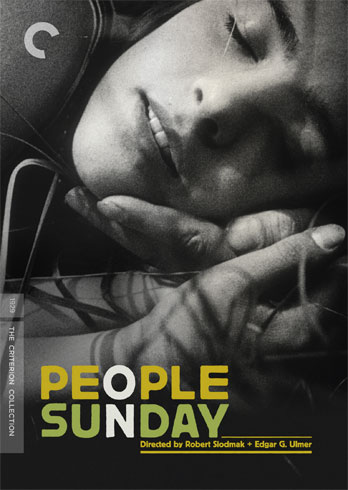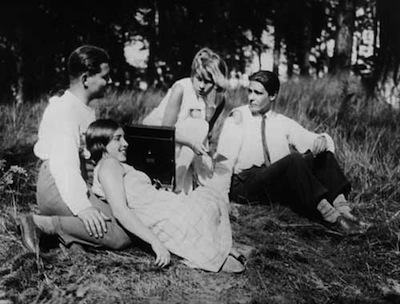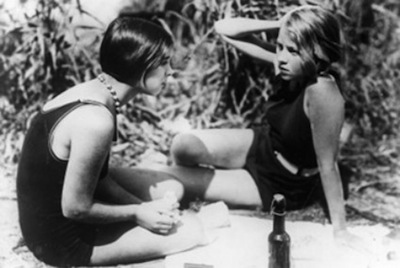
Sometimes a DVD release feels more like the product of a daring rescue mission than it does a movie premiere. Like the producers and technicians and artisans went spelunking into some cinematic cave to pull out a frail motion picture that had fallen in the hole and broken its leg.
People on Sunday is an enchanting curio from cinema's past, a 1930 silent film with murky origins, missing pieces, and a backstory as fascinating as what actually made it onto the screen. The German movie has a credits list that reads like a who's who of classic Hollywood craftsmen, but reading over the testimonials in the booklet that comes with the Criterion release of the film, there are many different takes on who did what. Given that the principle participants have long since shuffled off this mortal coil, there will likely be no getting to the bottom of it. All we have left is the mystery...and the wonderful film.
The movie is called People on Sunday, and that's exactly what it's about. Five lives intersecting on a Sunday afternoon, and specifically, four of them as they go from Berlin to the lakeside of Nikolassee to enjoy their day off. Put together as an independent production to compete with the all-powerful German studio UFA, People on Sunday was approached as an experiment. To keep costs down, the filmmakers found five non-actors and paired them together, playing versions of themselves, engaged to act in scripted scenarios, but in a manner prefiguring the Italian Neorealists. They were encouraged to be themselves, to not be actors.
The five are a taxi driver, a record store clerk, a wine salesman, a film extra, and a model. The driver and the model are dating, and the wine seller is their neighbor. The other two girls are friends. The wine seller, Wolfgang, meets the extra, Christl, on Saturday and makes a date with her for the day after. She brings along her friend Brigitte, and he brings along Erwin. Erwin's gal, Annie, never makes it out of bed, so he ends up being Wolfgang's wingman for the whole day. The wine seller is a true wolf, however, and his pushy pick-ups drive Christl away, and when he then turns his attention to Brigitte, it causes drama between the two girls. The romance plays out as they enjoy the water and the forest, having a picnic and playing records--a break from the working week, a respite from city life.

People on Sunday is itself meant as a temporary diversion, a representation of the brief pleasures the common man enjoys that would also give similar pleasure to all who watch it. And boy, does it ever work as such! This simple story of a day at the beach is charming and seductive, and even as Wolfgang reveals what a cad he is and the drudgery of Monday morning starts up again, the smile that the excursion has inspired doesn't fade. In addition to the story, the filmmakers also sidetrack into documentary footage of what other people are doing with their time off, both on the streets of Berlin and out in the sand of Nikolassee. Among these is a delightful centerpiece in which a photographer takes pictures of the daytrippers. It's a parade of German faces, young and old, people being themselves and frozen in time in the seconds it takes to create a snapshot. To go along with this, the Mont Alto Orchestra has created a period-sounding musical score, lending both humor and pathos to the proceedings. Their work is particularly effective when Annie plays her records, and the musicians recreate popular tunes from an afternoon in the sun long ago. (Criterion also offers a second score by Elena Kats-Chernin and the Czech Film Orchestra that is more contemporary in approach.)
In less talented hands, People on a Sunday could have ended up a mere trifle, but the eager young talent that gathered to pull this experiment off show a preternatural gift for making movies. It's no surprise that they would all eventually leave Germany and make a name for themselves in Hollywood. In terms of the credits, things break down something like this: Kurt Siodmak and Billie Wilder observed people on their actual Sunday activities, and out of their notes, Wilder fashioned a script. Robert Siodmak and Edgar G. Ulmer directed, with Eugene Schüfftan serving as cinematographer and Fred Zinnemann assisting him. In the U.S., Kurt would become Curt and would write some of the great Universal monster movies, including The Wolf Man

Eugene Schüfftan may be the least recognized name amongst this roster, though Criterion fans should know him as the man who shot Eyes Without a Face and Port of Shadows, in additon to some Hollywood pictures. His cinematography on The Hustler
Also in the supplements is a half-hour documentary from 2000 called Weekend am Wannsee. In it, filmmaker Gerald Koll attempts to reconstruct the history of People on Sunday, partially by talking to the man literally reconstructing the print, Martin Koerber. For anyone who ever wonders just how a film like this is out back together, there is a fascinating explanation of how many versions Koerber had to work with, where they came from, and what they each had to offer. Surviving participants Curt Siodmak and actress Brigitte Borchert are also interviewed, and the documentary explores what happened to all the players following the movie's release.
The Blu-Ray of People on Sunday uses a print that cobbles together the most complete version of the film from a variety of sources. No absolutely whole version exists. Despite a warning card at the start of the movie alerting viewers to the fact that this version was pieced together from several prints, I would have never guessed. Though there is some damage and scratches here and there, nothing stands out as being obviously sourced from any different places, not nearly as much as, for example, the Argentinean clips in The Complete Metropolis [review]. The overall presentation is stellar, this rescue team brought People on Sunday out of the darkness with a minimum of injury.
This disc was provided by the Criterion Collection for purposes of review.

No comments:
Post a Comment